In the midst of this chaotic, late-2020 world, Yakuza: Like a Dragon is the most comforting game I’ve found by far. Yakuza games have always offered wildly captivating plots, ridiculous combat systems, and endless opportunities for digital tourism, but I’m mostly finding Like a Dragon such a great source of joy because of its fresh new lead, Ichiban Kasuga. Ichiban is the series’ most relatable protagonist, one of its best characters, and the hero I need right now.
The Two Dragons
I should mention that I love Kazuma Kiryu, the RPG series’ long-running protagonist. When I first played Yakuza 0 (which served as my introduction to the series), he quickly became one of my favorite video game protagonists, driving me to check out all of his other adventures. Being at once a paragon of idealized Yakuza honor and masculinity as well as a big beefy awkward shy boy, Kiryu was an easy character to adore. To replace him would always be impossible, but with Like a Dragon, Ryu Ga Gotoku Studio has given him a worthy successor. It did so by making Ichiban polarizingly different.
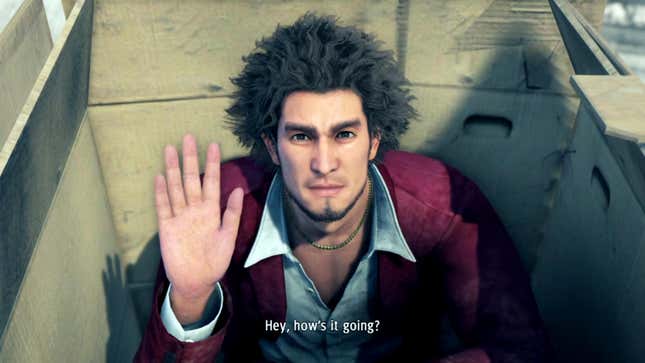
To describe Ichiban Kasuga in a few words, he’s a little shit. He’s a rascal, a dumb ass, and a little bit vain. Perhaps most importantly, Ichiban is a huge nerd. None of this is to say he lacks Kiryu’s sense of chivalry, honor, loyalty, or open-mindedness. It’s just that he expresses those traits differently. For instance, at one point in Like a Dragon, a group of men use moral outrage as an excuse to protest a brothel and harrass the sex workers therein. Whereas Kiryu may have just beat them up, Ichiban threatens to rain a garbage bin’s worth of cum-soaked tissues on them. (He beats them up when they come back a second time, though.)
Ichiban Kasuga’s story begins almost identically to that of Kiryu’s. He grew up an orphan before going to work as a young member of the massive Tokyo-based Tojo Clan. One night, he takes the fall for the murder of a higher-up, is expelled from the Yakuza, and spends almost two decades in prison. Upon release, Kasuga finds the world he knew is gone and many of the people he admired have betrayed him and changed for the worse. But the differences speak volumes about each character.
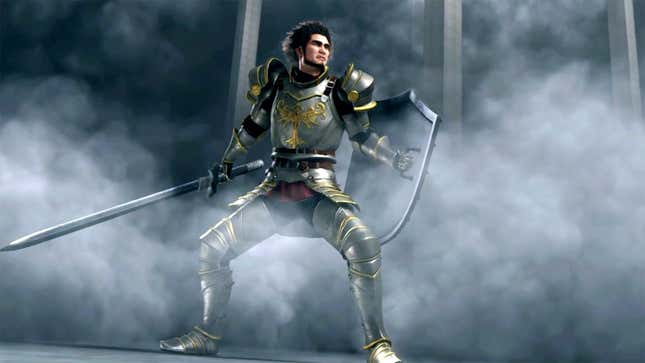
For one, Kiryu grew up at an orphanage with his chosen brother and the girl he loved. Ichiban grew up in a soapland (a form of legal brothel) and was adopted by its owner and raised by the working-class people of Kamurocho (the Yakuza games’ fictionalized version of Kabukicho, Tokyo’s red-light district). His unorthodox youth gave him an appreciation for the people society casts off, and having spent so much time alone in his room playing Dragon Quest games alone primed his hyperactive imagination to imagine all of his real-life brawls as turn-based RPG battles.
As for their criminal careers, while Kiryu was already a Yakuza of some notoriety at 27—feared and renowned as “The Dragon of Dojima” and on the verge of starting his own subsidiary family—at Like a Dragon’s start, Ichiban Kasuga is only a few years younger, and a low-level grunt who, though favored as a son by family patriarch Masumi Arakawa, is barely able to competently make collections. He lacks upward mobility as a Yakuza because he’s far more concerned with chasing a noble if naive idea of duty and honor than making money, and Ichiban’s failure to thrive earns him a dragon-based epithet of his own...
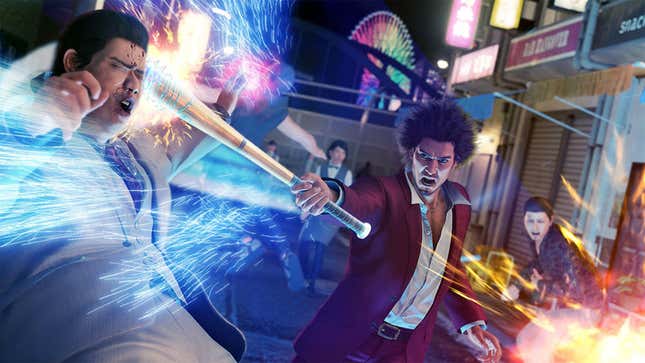
The Dragon of Rock Bottom
Ichiban goes to prison on the first night of the 21st century, and doesn’t get out until 18 years later, with nearly two decades’ worth of culture and change having passed him by, not to mention Arakawa and the rest of his Yakuza family having forgotten him and his sacrifice. When Ichiban seeks out his former mentor in hope of answers, he ends up shot by the very father figure he admired, and wakes up in a dumpster in the unfamiliar city of Yokohama.
Ichiban is several years older than Kiryu was in the first few Yakuza games, but feels so much farther behind, for lack of a better term. Stuck in a place he doesn’t know with no prospects, community, money, or home, he, unlike Kiryu, does not meet anyone’s ideal. And that’s part of what makes him feel so real and relatable.
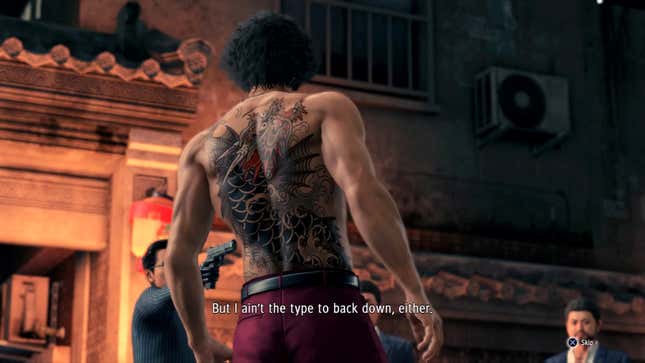
Like many of the gangsters in Yakuza, Ichiban has a prominent back tattoo. His is of something he calls a “dragonfish.” A Chinese legend tells of a koi fish that ascended a great waterfall, becoming a dragon upon doing so. Ichiban’s tattoo shows the koi mid-transformation, representing his gradual growth. Though he may have the fangs and power of a Gyarados, he often still flounders like a Magikarp. Ichiban falls and loses and even bottoms out, but he never lets that keep him from trying once again.
A few of the game’s early chapters consist of Ichiban just trying to pick up the pieces of his life while helping those around him. He makes friends. He protects the city’s underprivileged community from bullies. He has to find housing and freelance work. This all could end up being boring if Ichi wasn’t such a charismatic guy, but his personality shines. Unlike Kiryu’s more reserved sense of honor, Ichiban’s is tied up in his being a goofy, boisterous, and unabashedly earnest person who’s unfailingly open about his feelings and desire to help others.
This tendency to wear his heart on his sleeve and his single-minded drive to help the little guy is the trait that most sets him apart from other Yakuza protagonists. A 40-something ex-con still dreaming of being a hero like the ones in the Dragon Quest games he’s obsessed with, Ichiban Kasuga feels like a shonen anime protagonist dropped into the middle of a prestige crime drama, and somehow it works. Ichiban doesn’t express his feelings because he has to, but rather because he wants to. He wants to make a difference in the lives of the people around him and wants to make them feel seen.
And they do. That’s why he has a party.
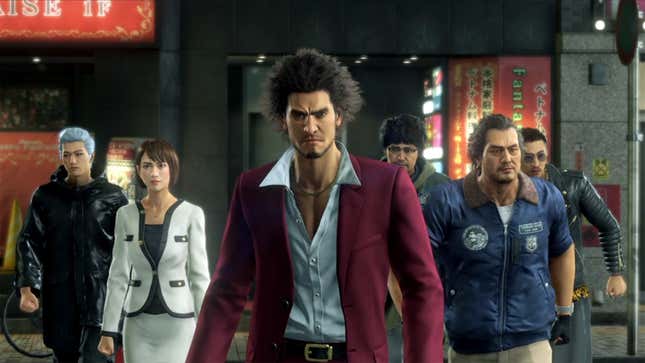
Party All The Time / Like a Dragon (Quest)
In his review of Dragon Quest XI, former Kotaku video producer Tim Rogers described the main hero’s relationship to his party as that of “a man surrounded by loyalty and love.” As I played through dozens of hours of Yakuza: Like a Dragon, this phrase popped in my head again and again as the perfect descriptor of Ichiban. Yes, Ichiban can beat the hell out of some bullies with a baseball bat, breakdance moves, or some flaming spatulas, but his greatest strength is his ability to connect with others.
Though he starts alone, Ichiban’s party grows steadily along the course of the game. He tries to help people and it draws both strangers and enemies into liking him. Be it an ex-detective with a score to settle, an unhoused ex-nurse who breathes fire, a bar owner distanced from her family, or straight-up hitmen and gang leaders, they’re all people who are down on their luck or who’ve cut themselves off from others, and they all slowly warm up to Ichiban’s charms.
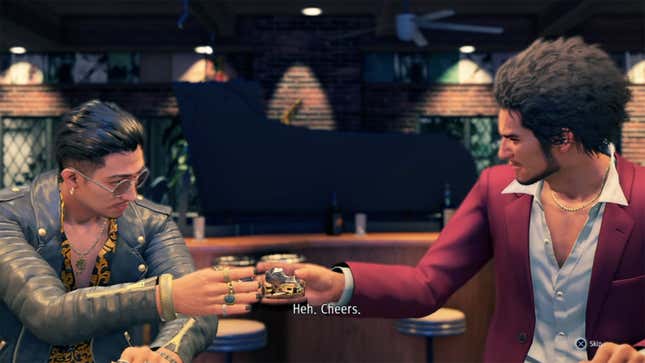
The party’s chats are my absolute favorite part of Like a Dragon. Conversations can occur while eating at restaurants, over a couple of drinks, or just while running around town. I love watching Ichiban bond with an assassin over their gamer roots. I love watching a Chinese gangster quiz his friends on what technically counts as dim sum. I don’t think I could ever get tired of these characters tipsily describing their checkered pasts or explaining why hot milk tastes so good. It reminds me of my own friends and all the hangouts and dumb conversations I’ve dearly missed while social distancing.
In a Kiryu-led Yakuza, an RPG-like party system couldn’t exist. Kiryu was always willing to help others, but was defined by his stoicism and refusal to let people get too close. It’s Ichiban that makes it work, by not only helping people in need, but bringing people together and seeing the best in them even when they can’t. He endears people to himself through courage, kindness, honesty, and sheer dumbassery.
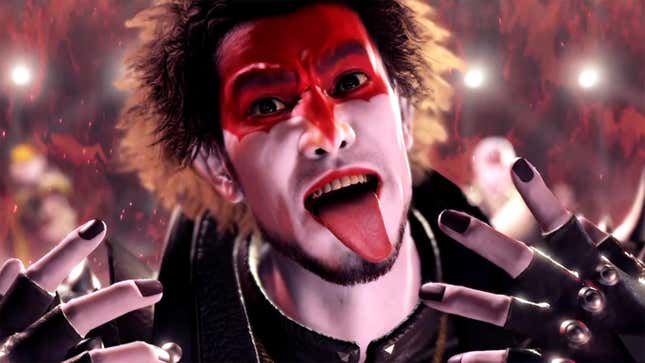
As someone who also went from lonely troubled gamer youth to goofy extroverted bimbo adult with incredibly loud hair, I can’t help but feel a bit of kinship with Ichiban in a way I never did with Kiryu. I appreciate that Ichiban fucks up and can make foolish decisions based on his emotions. Throughout the Like a Dragon story, he hits multiple low points, inflicted both by others and himself. But he never lets those failures and losses make him ashamed or stop him from getting back up. Cheesy as it is, that inspires me.
Yakuza: Like a Dragon is a game about being down on your luck. It’s about a bunch of broke freelancers taking any job that pays and finding pleasure in the little things, like eating kalbi, singing karaoke, or beating up sexual predators. It’s about relying on your homies when the world stops making sense, and trying to better the communities around you. When you think about it, maybe the real Yakuza were the friends we made along the way.
Chingy Nea is a writer, comedian, and critically acclaimed ex-girlfriend based out of Oakland and Los Angeles.




